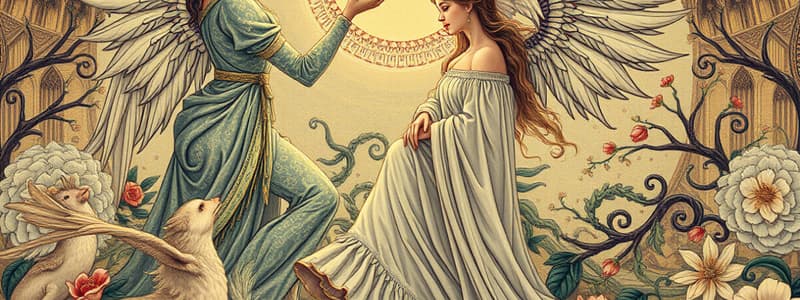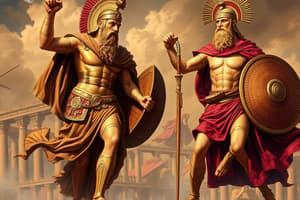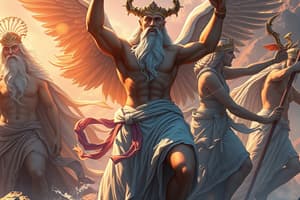Podcast
Questions and Answers
Which archetype does Narcissus represent in the story of the flower of that name?
Which archetype does Narcissus represent in the story of the flower of that name?
- Ingénue (correct)
- Antihero
- Hero
- Wicked Witch
Which field does not show the influence of Greek mythology and symbolism?
Which field does not show the influence of Greek mythology and symbolism?
- Art
- Technology (correct)
- Sports
- Literature
Which purpose of mythology is illustrated by the myth of Arachne?
Which purpose of mythology is illustrated by the myth of Arachne?
- Entertainment
- History
- Religion (correct)
- Science
Which situational archetype is seen in the story of Perseus?
Which situational archetype is seen in the story of Perseus?
Explain how the Antihero archetype differs from the Hero archetype.
Explain how the Antihero archetype differs from the Hero archetype.
What is an example of the influence of Greek mythology and symbols on our culture?
What is an example of the influence of Greek mythology and symbols on our culture?
Name and explain which character archetype fits Theseus best.
Name and explain which character archetype fits Theseus best.
Discuss the archetypes you found in the story of Echo and Narcissus.
Discuss the archetypes you found in the story of Echo and Narcissus.
Identify the purposes of myth found in the story of Arachne and explain how it illustrates each purpose.
Identify the purposes of myth found in the story of Arachne and explain how it illustrates each purpose.
Which archetypal character fits the character of Ulysses best?
Which archetypal character fits the character of Ulysses best?
Name and explain the archetypes illustrated in the myth of Cupid and Psyche.
Name and explain the archetypes illustrated in the myth of Cupid and Psyche.
Explain how the myth of Perseus illustrates the influence of culture and history on a work's theme.
Explain how the myth of Perseus illustrates the influence of culture and history on a work's theme.
Flashcards
Ingénue
Ingénue
A character archetype representing innocence, naivety, and often a lack of experience.
Hero
Hero
A character archetype that embodies societal ideals and acts in the interest of others.
Antihero
Antihero
A character archetype that has some heroic qualities but is often selfish and more focused on their own well-being.
Hero's Journey
Hero's Journey
Signup and view all the flashcards
Explanatory Myths
Explanatory Myths
Signup and view all the flashcards
Societal Myths
Societal Myths
Signup and view all the flashcards
Religious Myths
Religious Myths
Signup and view all the flashcards
Hubris Myths
Hubris Myths
Signup and view all the flashcards
Tasks or Tests
Tasks or Tests
Signup and view all the flashcards
Love Myths
Love Myths
Signup and view all the flashcards
Cultural Influence Myths
Cultural Influence Myths
Signup and view all the flashcards
Fate Myths
Fate Myths
Signup and view all the flashcards
Study Notes
Greek Mythology Archetypes
- Narcissus exemplifies the archetype of Ingénue, symbolizing beauty and vanity.
- Antihero archetype contrasts with the Hero; Antiheroes may act selfishly or use immoral methods while still achieving worthwhile goals.
- The character of Theseus represents the Hero archetype due to his "heroic feats" and significant accomplishments like defeating the Minotaur.
Influence of Greek Mythology
- Greek mythology significantly permeates modern culture, including the names of planets and constellations, the Olympic Games, and various literary works.
- Technology is an example of a field largely unaffected by Greek mythology.
Mythological Purposes
- The myth of Arachne highlights several purposes:
- Religious aspects detailing the power of gods and the consequences of hubris.
- It establishes cultural codes of acceptable behavior.
- It explains natural phenomena, specifically how spiders weave their webs.
- The myth serves as entertainment, fulfilling early literature's purpose.
Situational Archetypes
- A prominent situational archetype in the story of Perseus is the Hero's Journey, reflecting the hero's quest narrative.
- The myth of Cupid and Psyche features several situational archetypes, including Tests and True Love's Kiss, illustrating themes of love and transformation.
Character Analysis
- Echo represents an Ingénue archetype, embodying beauty with a lack of depth, and experiences Unrequited Love with Narcissus.
- Psyche, in Cupid and Psyche, evolves from an Ingénue into a clever woman, facing challenges represented by her tasks and the influence of characters like Venus, portrayed as a Wicked Witch.
Cultural and Historical Influence
- The myth of Perseus demonstrates how cultural values evolve; he symbolizes a transition from traditional warrior leadership to a ruler focused on societal welfare, reflecting changing societal norms.
Studying That Suits You
Use AI to generate personalized quizzes and flashcards to suit your learning preferences.




